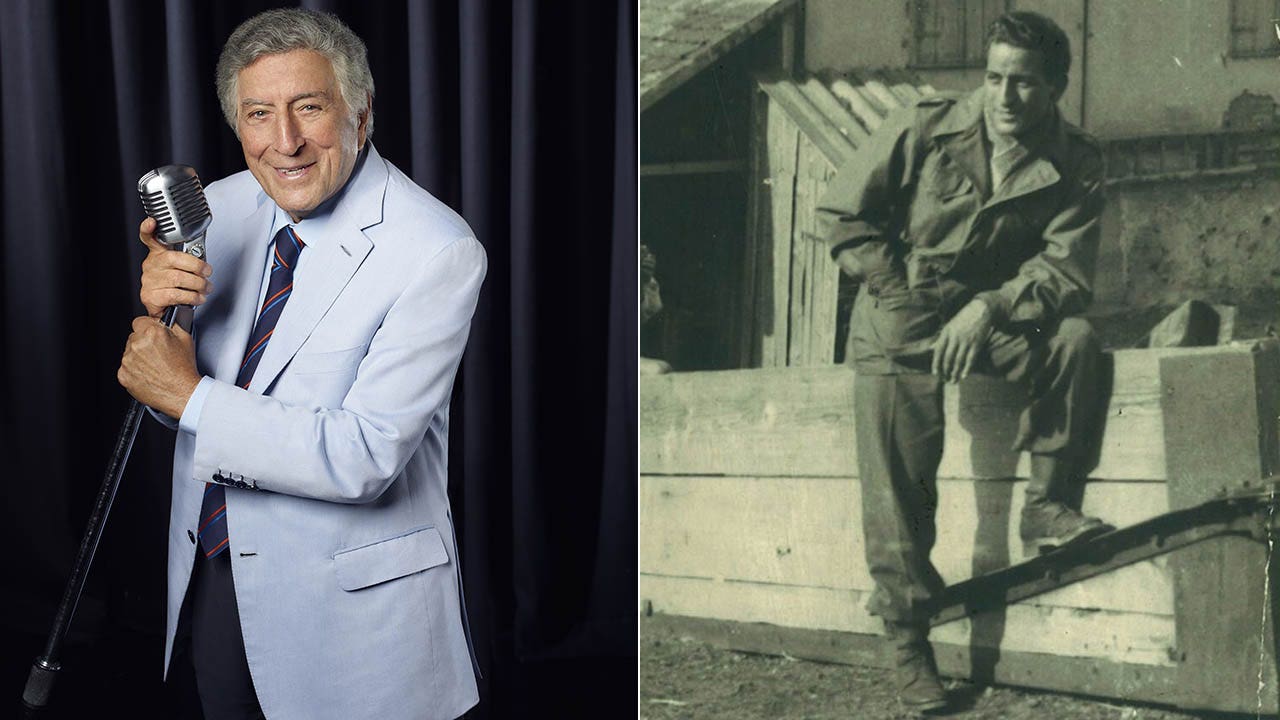Tony Bennett, the iconic jazz singer who recently passed away at the age of 96, had a remarkable start to his career. Before captivating audiences with his mesmerizing voice, Bennett served his country in the European theater during World War II. Drafted into the U.S. Army at 18 years old in 1944, he began his military service the following year, being deployed to the front lines after the Battle of the Bulge resulted in heavy casualties for the Allied Forces. In his autobiography “The Good Life,” published in 1998, Bennett reflected on how his wartime experiences shaped the rest of his life and his strong opposition to war.
Bennett’s journey began at Fort Dix, New Jersey, where he completed his basic training after being drafted in November 1944. From there, he became an infantry rifleman at Fort Robinson, Arkansas, before being sent to Le Havre, France, in late 1944. Joining the 255th Infantry Regiment of the 63rd Infantry Division, known as the “Blood and Fire” division, Bennett was part of a group of replacement troops tasked with replenishing the ranks of units that had suffered significant losses during the Battle of the Bulge.
In an interview with Marc Myers, a Wall Street Journal contributor and author, Bennett expressed his belief that he would not survive the war. The lack of preparation and training for the front lines left the troops in a precarious position. Nonetheless, Bennett persevered, digging foxholes in the frozen ground while facing the constant threat of death. He learned a valuable lesson during his time as a rifleman—avoid movements that could reveal his position, as detection could mean certain danger.
Life on the front lines was a harrowing experience for Bennett and his comrades. The relentless bombings that shook them from their sleep and the devastating aftermath they witnessed in the form of dead soldiers, horses, and bomb craters left an indelible mark on Bennett’s psyche. He expressed his disdain for the portrayal of war in movies, emphasizing that the reality of war far surpassed any fictional horror or adventure.
In March 1945, Bennett and his company ventured into Germany, engaging in the slow and methodical process of reclaiming German towns from the Nazi forces, one house at a time. Amidst the chaos and destruction, Bennett found solace and inspiration when he attended a USO show featuring the legendary entertainer Bob Hope. Witnessing Hope’s ability to uplift and entertain the troops, Bennett realized the power of laughter and music as gifts to share with others. This experience ignited his desire to pursue a career in show business and offer joy through his singing.
The final mission of Bennett’s military service took him and his company to a concentration camp near the infamous Dachau Concentration Camp in Germany. Unlike many other liberated camps, where the Germans had already fled, leaving behind empty barracks and deceased prisoners, Bennett’s unit encountered resistance from German soldiers who had chosen to stand their ground. They fought their way to the camp, where they discovered the emaciated survivors, their faces reflecting disbelief and fear. Bennett helped provide food, water, and medical care, but it took time to build trust as the survivors initially feared that the soldiers were there to harm them.
After the surrender of Germany’s armed forces on May 8, 1945, Bennett continued serving with the occupying forces as he had only been in the war for four months. He joined a Special Services unit tasked with entertaining the remaining Allied soldiers. During this time, Bennett faced demotion and had to perform grave-digging duties as a punishment for having Thanksgiving dinner with his Black friend who was serving in the army. Racial segregation was prevalent in the military at that time, and Bennett’s experience with it fueled his passion for civil rights activism. He later marched alongside Martin Luther King Jr. in Selma.
Bennett’s time in the military profoundly transformed him, and he emerged as a different person. After the war, he crossed paths with Bob Hope again, who played a crucial role in shaping Bennett’s stage name. With his military service behind him, Tony Bennett embarked on an illustrious singing career that spanned seven decades, leaving an indelible mark on the world of music.
In conclusion, Tony Bennett’s journey from the battlefield to the stage is a testament to the resilience of the human spirit. His experiences during World War II instilled in him a profound distaste for war and a commitment to spreading joy and laughter through his music. Bennett’s story serves as a reminder of the power of art to heal and uplift even amidst the darkest of times.
Denial of responsibility! VigourTimes is an automatic aggregator of Global media. In each content, the hyperlink to the primary source is specified. All trademarks belong to their rightful owners, and all materials to their authors. For any complaint, please reach us at – [email protected]. We will take necessary action within 24 hours.


